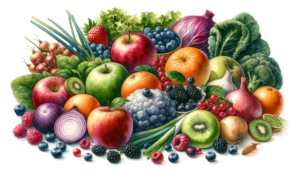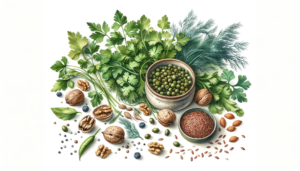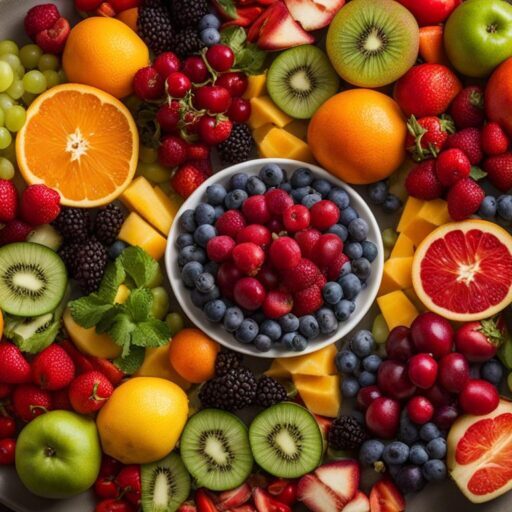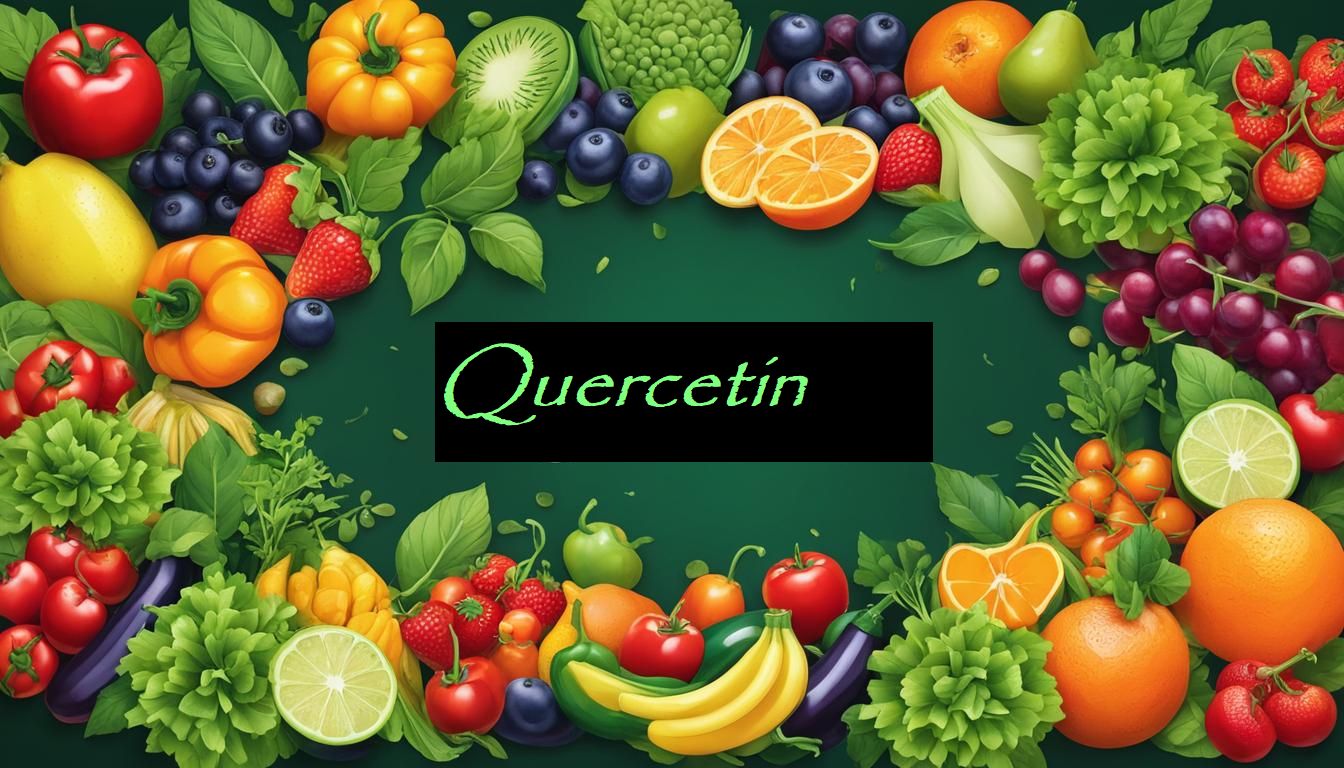Quercetin, a natural plant compound belonging to the class of flavonoids, is gaining recognition for its potential health benefits. This potent antioxidant is found in various quercetin foods, fruits, vegetables, herbs, and spices, offering a wide range of advantages for overall wellness.
Studies have shown that quercetin possesses anti-inflammatory properties, helps boost the immune system, and acts as an antioxidant, neutralizing harmful free radicals in the body. Additionally, quercetin has been associated with potential benefits for heart health, cancer prevention, and allergies.
In this article, we will delve into what quercetin is, the best quercetin foods, and the potential health benefits quercetin offers.

Key Takeaways:
- Quercetin is a natural plant compound found in a number of different foods, including fruits, vegetables, herbs, and spices.
- It has antioxidant, anti-inflammatory, and immune-boosting properties.
- Quercetin may benefit heart health, help prevent cancer, and provide relief from allergies.
- Including quercetin foods in your diet may help you reap these health benefits.
- Consider combining quercetin foods with zinc, vitamin C, or bromelain to enhance its bioavailability and effectiveness.
What is Quercetin?
Quercetin is a flavonoid that belongs to the polyphenol family. It is a naturally occurring compound found in plants and can be responsible for the bright colors of some fruits and vegetables. Quercetin is known for its potent antioxidant properties, which help neutralize harmful free radicals in the body. It also has anti-inflammatory effects and can help support the immune system. Quercetin is available as a dietary supplement and can be found in various quercetin food sources.
“Quercetin is a powerful flavonoid with antioxidant and anti-inflammatory properties.”
Top Food Sources of Quercetin
When it comes to incorporating quercetin into your diet, there are various quercetin foods to choose from. Including a variety of quercetin-rich foods in your meals can not only enhance the flavor but also provide you with numerous health benefits.

Quercetin Fruits and Vegetables
One of the best ways to increase your quercetin intake is by consuming a wide range of fruits and vegetables. These colorful and nutritious quercetin foods contain not only quercetin but also other essential nutrients that support overall health. Here are some examples:
- Apples
- Berries (such as cranberries and blueberries)
- Citrus fruits (such as oranges and lemons)
- Onions
- Leafy greens (such as kale and spinach)
Including these fruits and vegetables in your diet can help you meet your daily quercetin needs while enjoying a wide array of flavors and textures of different quercetin foods.

Quercetin Herbs and Spices
Add some extra flavor and quercetin to your dishes by incorporating various herbs and spices. Not only will these seasonings enhance the taste of your meals, but they will also contribute to your quercetin intake. Some herbs and spices high in quercetin include:
- Parsley
- Capers
- Dill
- Cilantro
By using these herbs and spices in your cooking, you can easily boost the quercetin content of your meals and enjoy their aromatic and flavorful qualities.
Nuts and Seeds
If you’re looking for a healthy and convenient snack that also provides a good amount of quercetin, consider including nuts and seeds in your diet. These crunchy and nutritious quercetin foods are not only packed with essential nutrients but also contain quercetin. Some examples of nuts and seeds rich in quercetin are:
- Almonds
- Walnuts
- Flaxseeds
You can enjoy these nuts and seeds as a standalone snack, add them to salads, smoothies, or incorporate them into your baked goods for an extra nutty and nutritious boost.
Quercetin Foods List
| Fruits and Vegetables | Herbs and Spices | Nuts and Seeds |
|---|---|---|
| Apples | Parsley | Almonds |
| Berries (cranberries, blueberries) | Capers | Walnuts |
| Citrus fruits (oranges, lemons) | Dill | Flaxseeds |
| Onions | Cilantro (coriander) | |
| Leafy greens (kale, spinach) |
Potential Health Benefits of Quercetin Foods
Quercetin, a powerful antioxidant, offers a range of potential health benefits. Its antioxidant properties help neutralize free radicals and reduce oxidative stress, promoting overall health and well-being. By protecting cells from damage, quercetin contributes to the maintenance of a healthy body.
In addition to its antioxidant effects, quercetin has been studied for its role in supporting heart health. It may help reduce inflammation, regulate blood pressure, and improve blood vessel function. These cardiovascular benefits contribute to a healthier heart and circulatory system.
“The results of the meta‐analysis showed a statistically significant effect of quercetin supplementation in the reduction of BP, possibly limited to, or greater with dosages of >500 mg/day. Further studies are necessary to investigate the clinical relevance of these results and the possibility of quercetin application as an add‐on to antihypertensive therapy.” (Serban 2016)
Quercetin also exhibits immune-boosting properties, enhancing the function of immune cells and reducing inflammatory responses. By supporting the body’s defense against infections and diseases, quercetin aids in the maintenance of a robust immune system.
Furthermore, quercetin has shown potential anti-cancer properties. It has been found to inhibit the growth of cancer cells, reducing the risk of certain types of cancer. Moreover, quercetin may enhance the effectiveness of conventional cancer treatments, making it a valuable component in cancer prevention and management.
For those struggling with allergies, quercetin offers relief. It helps stabilize mast cells and reduces the release of histamine, providing relief from sneezing, itching, and nasal congestion. As a natural remedy, quercetin can alleviate allergy symptoms and improve quality of life.
Aside from these specific benefits, quercetin has also been associated with potential advantages for brain health, gut health, and exercise performance. Its anti-inflammatory effects can be beneficial for conditions such as arthritis, contributing to overall well-being.
In order to maximize the benefits of quercetin, consider enhancing its bioavailability. Consuming quercetin with zinc and vitamin C can improve its absorption and utilization in the body. Additionally, combining quercetin with bromelain, an enzyme found in pineapple, can enhance its anti-inflammatory and antioxidant effects, making it more effective in providing health benefits.
“Bromelain is a crude extract of the pineapple that is considered as a food supplement and is freely available to the general public in health food stores and pharmacies around the world (Pavan et al., 2012). Bromelain is also demonstrated to improve oral bioavailability of quercetin up to 80% similar to vitamin C (Manach et al., 2005; Harwood et al., 2007).” (Onal 2021)
FAQ
What is quercetin?
Quercetin is a natural plant compound belonging to a class of flavonoids. It is found in various fruits, vegetables, herbs, and spices.
What are the top food sources of quercetin?
Quercetin can be found in fruits and vegetables such as apples, berries, citrus fruits, onions, and leafy greens. It is also present in herbs and spices like parsley, capers, dill, and cilantro. Nuts and seeds such as almonds, walnuts, and flaxseeds also contain quercetin.
What are the potential health benefits of quercetin?
Quercetin offers a range of potential health benefits, including antioxidant effects, support for heart health, immune-boosting properties, potential anti-cancer effects, relief from allergies, and additional benefits for brain health, gut health, and exercise performance.
How does quercetin support heart health?
Quercetin may help reduce inflammation, regulate blood pressure, and improve blood vessel function, all of which can contribute to a healthier cardiovascular system.
Can quercetin aid immunity?
Yes, quercetin has immune-boosting properties. It can enhance the function of immune cells, reduce inflammatory responses, and support the body’s defense against infections and diseases.
Can quercetin help prevent cancer?
Some studies suggest that quercetin may have anti-cancer effects. It has been found to inhibit the growth of cancer cells, reduce the risk of certain types of cancer, and enhance the effectiveness of conventional cancer treatments.
Is quercetin beneficial for allergies?
Yes, quercetin has been used as a natural remedy for allergies. It can help stabilize mast cells and reduce the release of histamine, which is responsible for allergic reactions. This can help alleviate symptoms such as sneezing, itching, and nasal congestion.
Are there any other benefits of quercetin?
Quercetin has been associated with additional benefits for brain health, gut health, and exercise performance. It may also have anti-inflammatory effects, which can be beneficial for conditions such as arthritis.
How can I enhance the bioavailability of quercetin?
Bioavailability can be enhanced by a consuming foods that combine zinc and quercetin and vitamin C. These nutrients can improve the absorption and utilization of quercetin in the body, maximizing its benefits.
Should I combine quercetin with bromelain?
Combining quercetin with bromelain can enhance its anti-inflammatory and antioxidant effects. Bromelain can help increase the absorption and bioavailability of quercetin, making it more effective in providing its health benefits.


